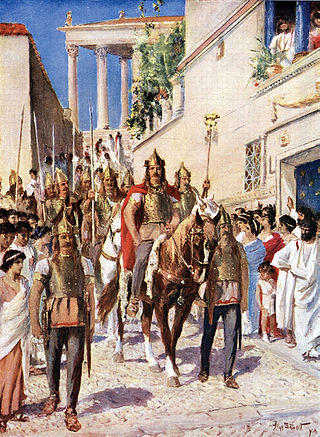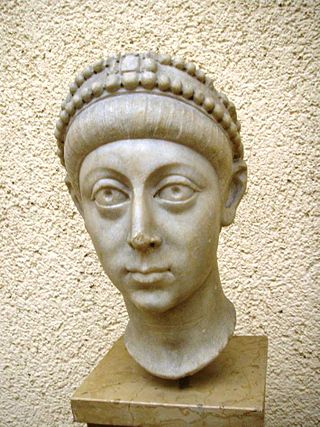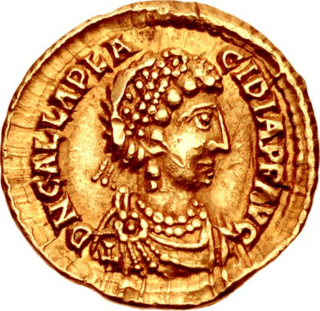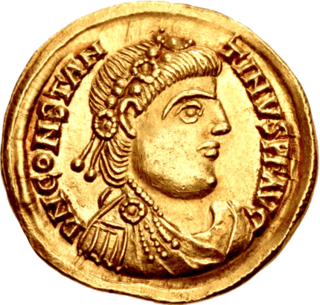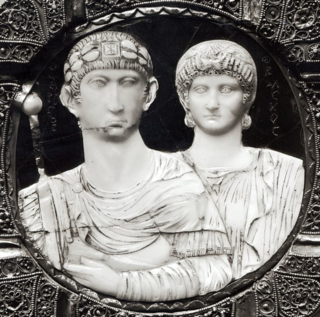Empress
Her sister Maria having died some time before, Thermantia became the second wife of Honorius in 408.
Peace with Alaric
However the wedding would prove short-lived. Stilicho had proposed an alliance with Alaric I of the Visigoths in order to enforce the claims of Honorius to the Praetorian prefecture of Illyricum. At about the time of his daughter's marriage, "Stilicho was informed, that Alaric had left Epirus, and having passed through the defiles that form a passage from Pannonia to Venetia, had pitched his camp at a town called Emo, which is situated between the Pannonia Superior and Noricum. ... Alaric, having marched out of Emo, and crossed the river Aquilis, passed over the Apennine Mountains, and entered Noricum. The Apennine Mountains are situated on the borders of Pannonia, and render the way into Noricum very narrow, wherefore, if the pass were guarded by a small number, a large force would find great difficulty in penetrating it. Notwithstanding this difficulty, Alaric advanced through into Noricum, and from thence sent messengers to Stilicho, to desire a sum of money not only in consideration of his stay in Epirus, which he said was made at the persuasion of Stilicho, but also to defray his journey into Noricum and Italy. But Stilicho, although he received the embassy, left those who brought it at Ravenna, and proceeded himself to Rome, with a design to consult the emperor and the senate upon this affair. [5]
"When the senate was assembled at the imperial palace, and deliberated whether to declare war, most of them were disposed for war. Stilicho, and a few others who complied with him merely through fear, were of a contrary opinion, and voted for a peace with Alaric. When those who preferred a war desired of Stilicho his reason for chusing peace rather than war, and wherefore, to the dishonour of the Roman name, he was willing basely to purchase it with money, he replied, "Alaric has continued this length of time in Epirus that he may join with me against the emperor of the east, and separating the Illyrians from that dominion, add them to the subjects of Honorius." This, he said, would have been effected before this period, had not letters in the meantime arrived from the emperor Honorius, which deferred the expedition to the east, in expectation of which Alaric had spent so much time in that country. When Stilicho had said these words, he produced an epistle from the emperor, and said that Serena was the occasion of all, wishing to preserve an inviolable friendship between the two emperors. The senate, therefore, imagining that Stilicho spoke nothing but what was reasonable, decreed that Alaric should receive three thousand pounds of silver in consideration of maintaining peace, although most of them gave their voices more in dread of Stilicho than of their own judgment or inclination. For this reason, Lampadius, a person of exalted birth and rank, having uttered this Latin sentence, "Non est ista pax, sed pactio servitutis" ("This is not a peace, but a bond of servitude"), he was compelled, as soon as the senate was dismissed, to fly into a neighbouring church, belonging to the Christians, from the fear of being punished for the freedom with which he had expressed himself." [5]
"Stilicho, after having in this manner made peace with Alaric, prepared very earnestly for his journey, in order to put his designs in execution. The emperor declared, that he would also proceed from Rome to Ravenna, to view and encourage the army, especially as so powerful an enemy was arrived in Italy. Yet this he did not say of his own inclination, but was prompted to it by Serena. For she wished him to reside in a more secure city, that if Alaric should infringe the treaty and attack Rome, he might not take the emperor's person. She was the more zealous for his preservation, since her own security depended on his. Stilicho, however, being much averse to the emperor's journey to Ravenna, contrived many obstacles to prevent it. As the emperor, notwithstanding, would not alter his intentions, but was still determined on his journey, Sarus, a Barbarian, and captain of a company of Barbarians at Ravenna, excited a mutiny before the city at the instigation of Stilicho. His design was not really to throw affairs into confusion, but to deter the emperor from coming to Ravenna. But as the emperor persisted in his resolution, Justinian, an excellent lawyer at Rome, whom Stilico chose as his assistant and counsellor, through the sagacity of his judgment, formed a near conjecture of the design for which the emperor made that journey, and that the soldiers in Ticinum, who were disaffected to Stilicho, when the emperor arrived there, would reduce him into circumstances of great danger. He, therefore, continually advised him to dissuade the emperor from his present intentions. But when Justinian found that the emperor would not listen to the counsel of Stilicho, he forsook him, lest through his familiarity with Stilicho he should share in his misfortunes." [5]
Death of Arcadius
Arcadius, Honorius’ brother and the Eastern Roman emperor, died on May 1, 408. Though Honorius wished to travel East to oversee the succession of Arcadius’ son Theodosius II, Stilicho convinced him not to and instead went there himself.
Conspiracy of Olympius
"Stilicho, being in these circumstances, although he was not conscious of any ill intention either against the emperor or the soldiers, Olympius, a native of the vicinity of the Euxine Sea, and an officer of rank in the court-guards, concealed under the disguise of the Christian religion the most atrocious designs in his heart. Being accustomed, because of his affected modesty and gentle demeanor, to converse frequently with the emperor, he used many bitter expressions against Stilicho, and stated, that he was desirous to proceed into the east, from no other motive than to acquire an opportunity of removing the young Theodosius, and of placing the empire in the hands of his own son, Eucherius. These observations he made to the emperor as they were travelling, having then a good opportunity of doing it." [5]
"And when the emperor was at Ticinum, Olympius, accustoming himself to visit the sick soldiers, which was the master-piece of his hypocrisy, dispersed among them, likewise, similar insinuations. When the emperor had been at Ticinum four days, all the soldiers being convened into the court, the emperor appeared before them, and exhorted them to a war against the rebel Constantine. Finding that none of them were moved at any thing relative to Stilicho, Olympius was observed to nod to the soldiers, as if to remind them of what he had said to them in private. At this they were excited almost to madness, and killed Limenius, who was prefect of the court in the nations beyond the Alps, and with him Chariobaudes, the commander of the legions in those parts. For these two had accidentally escaped from the hands of the usurper, and were come to the emperor at Ticinum. Beside these two were slain Vincentius and Salvius, the former, the commander of the cavalry, and the latter of the domestic forces. As the tumult increased, the emperor retired into the palace, and some of the magistrates escaped. The soldiers, then dispersing themselves about the city, killed as many of the magistrates as they could lay hands on, tearing them out of the houses into which they had fled, and plundered all the town. So violent was the commotion, that the emperor, finding the disorder beyond remedy, put on a short mantle, and without either his long robe or his diadem, issuing into the midst of the city, had great difficulty in appeasing and restraining their fury. For those magistrates who were taken, even after their flight, were murdered. Among these were Naemorius commander of the court-bands, Petronius, the treasurer and steward of the emperor's private property, and Salvius, whose office it was to proclaim the intentions of the emperor upon any occasion, which officer had borne the title of Questor from the time of Constantine. Nor could the latter escape death, though he embraced the emperor's knees. The tumult continued till late in the night, and the emperor fearing lest any violence should be committed against his own person also, for which reason he withdrew. They then happened to find Longinianus, the prefect of the court for Italy, whom they put to death. All these magistrates were slain by the infuriated soldiers. There likewise perished so great a number of promiscuous persons as is beyond all computation." [5]
"When intelligence of this reached Stilicho, who was then at Bononia, he was extremely disturbed by it. Summoning, therefore, all the commanders of his confederate Barbarians, who were with him, he proposed a consultation relative to what measures it would be most prudent to adopt. It was agreed with common consent, that if the emperor were killed, which was yet doubtful, all the confederated Barbarians should join together, and fall at once on the Roman soldiers, and by that means afford a warning to all others to use greater moderation and submissiveness. But if the emperor were safe, although the magistrates were cut off, the authors of the tumult were to be brought to condign punishment. Such was the result of the consultation held by Stilicho with his Barbarians. When they knew that no indignity had been offered to the person of the emperor, Stilicho resolved to proceed no further in punishing or correcting the soldiers, but to return to Ravenna. For he reflected both on the number of the soldiers, and that the emperor was not stedfastly his friend. Nor did he think it either honourable or safe to incite Barbarians against the Roman army." [5]
Downfall of Stilicho
"Stilicho being therefore filled with anxiety concerning these circumstances, the Barbarians who were with him were very desirous of putting in force their former resolutions, and therefore endeavoured to dissuade him from the measures which he afterwards thought proper to be adopted. But being unable to prevail with him, they all determined to remain in some place until they should be better apprized of the emperor's sentiments towards Stilihco, with the exception of Sarus, who excelled all the other confederates in power and rank, and who, accompanied by the Barbarians under his command, having killed all the Huns who formed the guard of Stilicho while they were asleep, and having seized all the carriages that followed him, entered his tent, in which he remained to observe the event. Upon this Stilicho, observing that his Barbarians were quarrelling among each other, hastened to Ravenna, and engaged the cities, in which were any women or children belonging to the Barbarians, not to afford reception to any of the Barbarians if they should come to them." [5]
"In the meantime Olympius, who was now become master of the emperor's inclination, sent, the imperial mandate to the soldiers at Ravenna, ordering them immediately to apprehend Stilicho, and to detain him in prison without fetters. When Stilicho heard this, he took refuge in a Christian church that was near, while it was night. His Barbarians and his other familiars, who, with his servants, were all armed, upon seeing this expected what would ensue. When day appeared, the soldiers, entering the church, swore before the bishop, that they were commanded by the emperor not to kill Stilicho, but to keep him in custody. Being brought out of the church, and in the custody of the soldiers, other letters were delivered by the person who brought the first, in which the punishment of death was denounced against Stilicho, for his crimes against the commonwealth. Thus, while Eucherius, his son, fled towards Rome, Stilico was led to execution. The Barbarians who attended him, with his servants and other friends and relations, of whom there was a vast number, preparing and resolving to rescue him from the stroke, Stilico deterred them from the attempt by all imaginable menaces, and calmly submitted his neck to the sword. He was the most moderate and just of all the men who possessed great authority in his time. For although he was married to the niece of the first Theodosius, was entrusted with the empires of both his sons, and had been a commander twenty-three years, yet he never conferred military rank for money, or coveted the stipend of the soldiers to his own use. Being the father of one only son, he offered to him the office of tribune of the Notarii, and limited him neither to desire nor attempt obtaining any other office or authority. In order that no studious person, or astrologers, maybe ignorant of the time of his death, I shall relate, that it happened in the consulship of Bassus and Philippus, during which the emperor Arcadius submitted to fate, on the twenty-second day of August." [5]
Divorce of Thermantia
After the death of Stilicho, Honorius divorced his wife, and she was returned to the custody of her mother. Thermantia’s brother Eucherius was sought out and killed on Honorius’ orders.
During the prolonged siege of Rome, Serena was accused of conspiring with the Goths. Though Zosimus considered the accusation to be false, [10] she was executed with the approval of her cousin, Honorius’ half-sister Galla Placidia.

